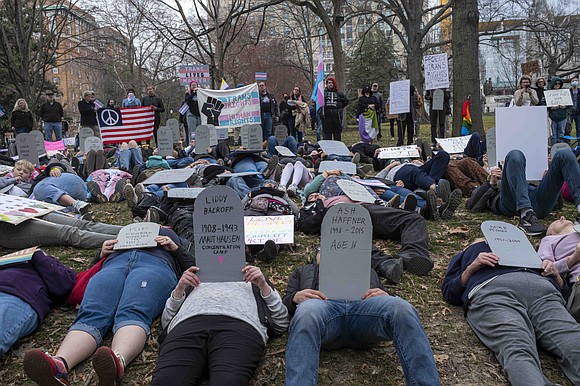Protesters decry anti-trans policies at Capitol Square demonstration
Speakers highlight the growing risks for transgender youth and families
Brodie Greene | 3/13/2025, 6 p.m.

On Saturday, Capitol Square was lined with tombstones, each bearing the name of a murdered transgender person. Activists, lying still on the lawn, symbolized the growing threat of violence and hatred against transgender individuals.
The “Prides of March” protest, organized by the Virginia chapter of 50501, amplified the voices of those who feel betrayed by the government. Since January, President Donald Trump has issued executive orders barring transgender women and girls from competing in women’s sports at federally funded schools, defining gender strictly as male or female, restricting gender-affirming care for minors, and targeting transgender individuals serving in the military.
Natalie Hawkins, a representative of the Party for Socialism and Liberation, told the crowd that transgender people are used as a scapegoat by both major parties to avoid addressing larger issues, such as the rising cost of living and climate change, she said.
“The ruling class is coming after trans people, not because we are dangerous to anybody, but because they need to divide and conquer the working class in this period of economic crisis,” she said.
In January, VCU Health suspended gender-affirming care to patients who are 19 years old or younger in response to an executive order that cut federal funding for such treatments. According to the American Medical Association, gender-affirming care is considered medically necessary and lifesaving.
Side by Side, a support organization for LGBTQ+ youth, provides services for hundreds of transgender youth in central Virginia, many of whom relied on VCU Health for gender-affirming care, according to Rosa Hamilton, director of outreach and support programs.
“For anyone who hasn’t met a trans kid or doesn’t understand, they’re just like any other kid. They don’t want to worry about where they’ll get their medicine, if they can go to school safely, or if they can use the bathroom in taxpayer-funded buildings,” Hamilton said.
Kelly Gring attended the protest with several family members, including her transgender son. Gring said her son knew from an early age that he was male.
“He is aware that our president doesn’t believe in his gender. I guess they want us to put him in a dress, tell him he’s a girl, and force him into that life. He knows that’s not how he wants to live,” Gring said.
People often ask Kelly if her son might change his gender identity later in life, something she recognizes as a real possibility.
“It’s like other things children explore. If you want them to talk to you about how they feel and what they’re thinking, they’ll trust you if it changes later on,” Gring said.
Aurora Higgs, a trans activist, said she lost her “spark” in recent months after Trump’s inauguration and subsequent executive orders.
“Out of nowhere, the world began to feel like a violent place. As a Black queer femme, it felt like every part of my identity was under attack,” Higgs said.
She believes the president’s actions are designed to instill fear and “neutralize” transgender people, but visibility and community can push back against that agenda.
“I want you to remember that we are a threat simply by living our lives, loving each other, and changing the world,” Higgs said. “We are a threat to hate, bigotry and fascism because of our self-determination.”






